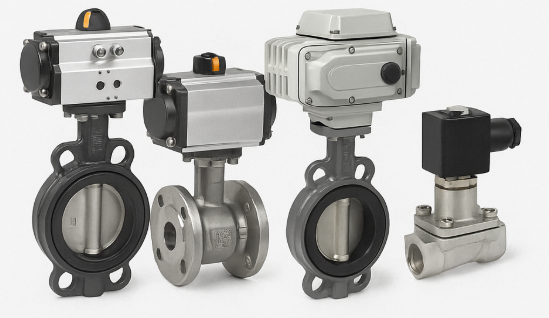The oil and gas industry is one of the most demanding sectors when it comes to valve performance. Pipelines, refineries, offshore platforms, and petrochemical plants all require valves that can withstand high pressure, extreme temperatures, and corrosive media. Choosing the right valve is not just about efficiency—it is about ensuring safety, reliability, and regulatory compliance.
Challenges in Oil & Gas Valve Applications
- High Pressure and Temperature – Valves must perform under ANSI 600, 900, or even higher classes.
- Corrosive Media – Oil, gas, and associated chemicals can quickly damage poorly selected materials.
- Fire Safety Requirements – API 607 or API 6FA fire-safe testing is mandatory for many projects.
- Harsh Environments – Offshore and desert conditions demand durable construction and coatings.
Common Valves Used in Oil & Gas
Ball Valves
- Best for: Shut-off in high-pressure pipelines
- Advantages: Tight sealing, fast operation
- Applications: Upstream pipelines, compressor stations, LNG terminals
Gate Valves
- Best for: Isolation in large bore pipelines
- Advantages: Full port design, minimal flow resistance
- Applications: Crude oil transfer, refinery lines
Globe Valves
- Best for: Flow regulation
- Advantages: Accurate throttling, robust design
- Applications: Steam, chemical dosing, high-pressure systems
Check Valves
- Best for: Preventing reverse flow
- Advantages: Simple design, automatic operation
- Applications: Pump discharge, LNG systems
Butterfly Valves
- Best for: Large diameter, low-pressure systems
- Advantages: Lightweight, cost-efficient
- Applications: Cooling water, low-pressure circulation lines
Knife Gate Valves
- Best for: Slurry or mixed media
- Advantages: Can handle solids, abrasive fluids
- Applications: Refinery wastewater, slurry handling
Materials Commonly Used
- Carbon Steel (A105, WCB) – Standard for high-pressure oil & gas applications
- Stainless Steel (316/304) – Excellent corrosion resistance in chemical service
- Duplex and Super Duplex – Ideal for offshore, seawater, and sour gas conditions
- Inconel, Monel, Hastelloy – For extremely corrosive and high-temperature environments
Why Partner With a Trusted Valve Supplier
- Certified Quality – API 6D, API 607, ISO, CE approvals available
- Wide Product Range – Ball, gate, globe, check, butterfly, knife gate, solenoid, and control valves
- Customized Solutions – Designed to meet project specifications and local standards
- Technical Support – Experienced engineers to assist with selection and documentation
Final Thoughts
Valves are critical to the safety and efficiency of oil and gas operations. By selecting the right type, material, and certification, you can extend equipment life, reduce maintenance costs, and ensure compliance with international standards.
📩 Looking for a reliable supplier of oil and gas valves? Contact us today and receive a tailored quotation within 24 hours.

